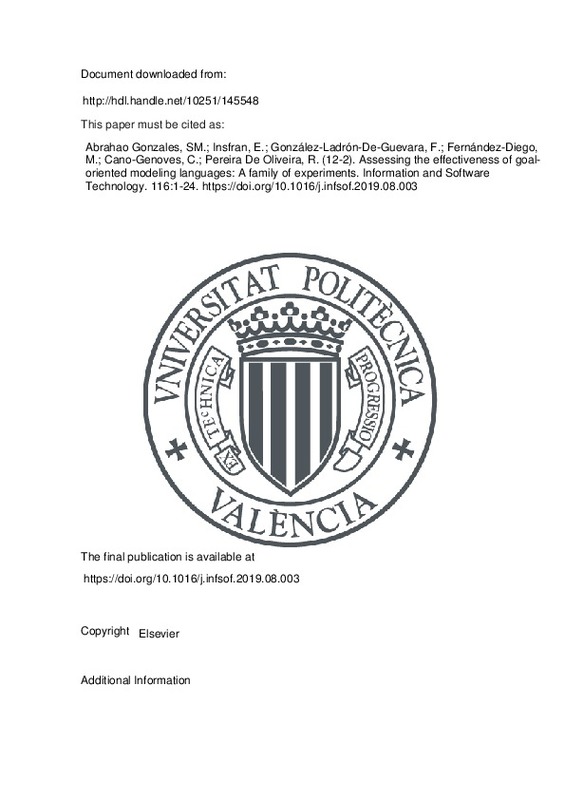JavaScript is disabled for your browser. Some features of this site may not work without it.
Buscar en RiuNet
Listar
Mi cuenta
Estadísticas
Ayuda RiuNet
Admin. UPV
Assessing the effectiveness of goal-oriented modeling languages: A family of experiments
Mostrar el registro sencillo del ítem
Ficheros en el ítem
| dc.contributor.author | Abrahao Gonzales, Silvia Mara
|
es_ES |
| dc.contributor.author | Insfran, Emilio
|
es_ES |
| dc.contributor.author | González-Ladrón-de-Guevara, Fernando
|
es_ES |
| dc.contributor.author | Fernández-Diego, Marta
|
es_ES |
| dc.contributor.author | Cano-Genoves, Carlos
|
es_ES |
| dc.contributor.author | Pereira de Oliveira, Raphael
|
es_ES |
| dc.date.accessioned | 2020-06-06T03:32:42Z | |
| dc.date.available | 2020-06-06T03:32:42Z | |
| dc.date.issued | 2019-12 | es_ES |
| dc.identifier.issn | 0950-5849 | es_ES |
| dc.identifier.uri | http://hdl.handle.net/10251/145548 | |
| dc.description.abstract | [EN] Context Several goal-oriented languages focus on modeling stakeholders' objectives, interests or wishes. However, these languages can be used for various purposes (e.g., exploring system solutions or evaluating alternatives), and there are few guidelines on how to use these models downstream to the software requirements and design artifacts. Moreover, little attention has been paid to the empirical evaluation of this kind of languages. In a previous work, we proposed value@GRL as a specialization of the Goal Requirements Language (GRL) to specify stakeholders' goals when dealing with early requirements in the context of incremental software development. Objective: This paper compares the value@GRL language with the i* language, with respect to the quality of goal models, the participants' modeling time and productivity when creating the models, and their perceptions regarding ease of use and usefulness. Method: A family of experiments was carried out with 184 students and practitioners in which the participants were asked to specify a goal model using each of the languages. The participants also filled in a questionnaire that allowed us to assess their perceptions. Results: The results of the individual experiments and the meta-analysis indicate that the quality of goal models obtained with value@GRL is higher than that of i*, but that the participants required less time to create the goal models when using i*. The results also show that the participants perceived value@GRL to be easier to use and more useful than i* in at least two experiments of the family. Conclusions: value@GRL makes it possible to obtain goal models with good quality when compared to i*, which is one of the most frequently used goal-oriented modeling languages. It can, therefore, be considered as a promising emerging approach in this area. Several insights emerged from the study and opportunities for improving both languages are outlined. | es_ES |
| dc.description.sponsorship | This work was supported by the Spanish Ministry of Science, Innovation and Universities (Adapt@Cloud project, grant number TIN2017-84550-R) and the Programa de Ayudas de Investigación y Desarrollo (PAID-01-17) from the Universitat Politècnica de València. | es_ES |
| dc.language | Inglés | es_ES |
| dc.publisher | Elsevier | es_ES |
| dc.relation.ispartof | Information and Software Technology | es_ES |
| dc.rights | Reserva de todos los derechos | es_ES |
| dc.subject | Requirements engineering | es_ES |
| dc.subject | Goal modeling | es_ES |
| dc.subject | GRL | es_ES |
| dc.subject | I* | es_ES |
| dc.subject | Controlled experiments | es_ES |
| dc.subject.classification | LENGUAJES Y SISTEMAS INFORMATICOS | es_ES |
| dc.subject.classification | ORGANIZACION DE EMPRESAS | es_ES |
| dc.title | Assessing the effectiveness of goal-oriented modeling languages: A family of experiments | es_ES |
| dc.type | Artículo | es_ES |
| dc.identifier.doi | 10.1016/j.infsof.2019.08.003 | es_ES |
| dc.relation.projectID | info:eu-repo/grantAgreement/UPV//PAID-01-17/ | es_ES |
| dc.relation.projectID | info:eu-repo/grantAgreement/AEI/Plan Estatal de Investigación Científica y Técnica y de Innovación 2013-2016/TIN2017-84550-R/ES/ADAPTACION DINAMICA DE SERVICIOS CLOUD CENTRADA EN EL USUARIO/ | es_ES |
| dc.rights.accessRights | Abierto | es_ES |
| dc.contributor.affiliation | Universitat Politècnica de València. Departamento de Sistemas Informáticos y Computación - Departament de Sistemes Informàtics i Computació | es_ES |
| dc.contributor.affiliation | Universitat Politècnica de València. Departamento de Organización de Empresas - Departament d'Organització d'Empreses | es_ES |
| dc.description.bibliographicCitation | Abrahao Gonzales, SM.; Insfran, E.; González-Ladrón-De-Guevara, F.; Fernández-Diego, M.; Cano-Genoves, C.; Pereira De Oliveira, R. (2019). Assessing the effectiveness of goal-oriented modeling languages: A family of experiments. Information and Software Technology. 116:1-24. https://doi.org/10.1016/j.infsof.2019.08.003 | es_ES |
| dc.description.accrualMethod | S | es_ES |
| dc.relation.publisherversion | https://doi.org/10.1016/j.infsof.2019.08.003 | es_ES |
| dc.description.upvformatpinicio | 1 | es_ES |
| dc.description.upvformatpfin | 24 | es_ES |
| dc.type.version | info:eu-repo/semantics/publishedVersion | es_ES |
| dc.description.volume | 116 | es_ES |
| dc.relation.pasarela | S\394754 | es_ES |
| dc.contributor.funder | Agencia Estatal de Investigación | es_ES |
| dc.contributor.funder | Universitat Politècnica de València | es_ES |







![[Cerrado]](/themes/UPV/images/candado.png)

